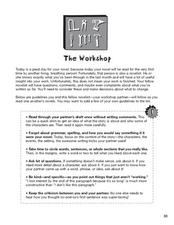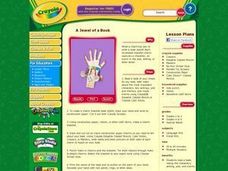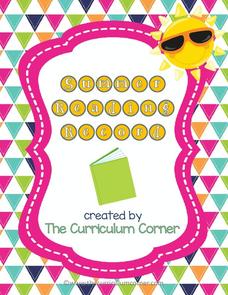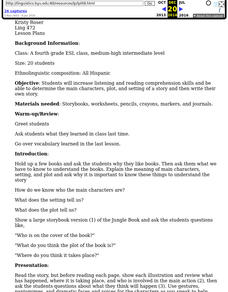Curated OER
Lesson Plan 4: Creating Main Characters
Creating a good main character is a must when writing a creative narrative or novel. Elementary aged writers create main characters for the novel they are writing. They first use themselves as a models, then create a character as a...
Classroom Adventures Program
Creating Characters
Examine character in depth. Over the course of these six lessons, learners explore their own character traits, determine the traits of characters in the books they read, practice comparing and contrasting, and collaborate in small...
Curated OER
Story Creation Magic: Character, Setting, Plot
Students review the terms plot, setting, and characters and examine how all of these elements are needed to make a story. They are given parts of stories and they try to identify all of those parts of the story.
Curated OER
Applying Character and Setting to Play Readings
Read Ira Sleeps Over, then identify elements of plays that are also common to books. Learners analyze character and setting, consider how these elements relate to a play, then write a one-paragraph skit using the characters from Ira...
Curated OER
Elements of Fiction
The metaphor of a pot of soup and a series of colorful templates remind young writers of the elements that make for a rich story. Pepper the plot with carrot/character, potato/point of view, corn/conflict, tomato/theme, and season with...
Curated OER
Compare and Contrast Two Settings in One Text
Look for the signal words! Scholars get both instruction and practice comparing and contrasting. Although it is completely scripted, it can also serve as a detailed outline. Demonstrate this as you read a passage (included) and search...
Curated OER
Mystery Lessons
Learn about mysteries with your readers. They will investigate plot, basic elements of mystery, famous characters, and become familiar with genre vocabulary. Bring in props and mystery books to begin and then have learners create story...
Curated OER
Noisy Nora, Studious Students: Story Elements
Alliterative adjective nicknames generate stories inspired by Rosemary Wells' book Noisy Nora (also a thematic complement to any class with children who make a ruckus to get attention). Class members explore basic story elements --...
Curated OER
The Workshop
Kids take a critical look at each other's work in order to understand the editing process while providing constructive suggestions. This handout really sets learners up to successfully offer constructive critique to their...
Curated OER
Setting's Effect on a Character's Actions
Do the actions of a character in a story change based on the setting the writer provides? Learners explore the concept of character action in relation to story setting by investigating the setting and events in the story Science...
Curated OER
A Jewel of a Book
Students read a book, noting the characters, setting, plot, and events. They gather, synthesize, and then select the most important data from their book to prepare a book report by decorating a charm bracelet with pertinent information...
Curated OER
Story Plan Graphic Organizer
In this story planner graphic organizer worksheet, students fill in the genre, characters, setting, plot, complication and resolution before they use the information to write a story. They also list useful words that will be used.
Curated OER
Pop-Up Puppets
Students read "Peter Spier's Circus!" and identify the literature's setting and characters. They work in small groups to create a circus stage set and puppets based on their reading. Students perform a puppet show using their set and...
Curated OER
Story Mapping
Help your learners map a story with a graphic organizer provided. Four squares for setting, problem, characters, and solution surround the circle for theme. Use this with any story you may be reading to go over important...
Curated OER
Story Setting - The Art Lesson by Tomi dePaola
Students read the book The Art Lesson by Tomi dePaola and analyze the story. For this setting lesson, students discuss the importance of the setting and how it helps us understand the story. Students answer questions and chart their...
Curated OER
Marking Time
Two narrative excerpts tell the same story from different points of view. In the first excerpt (first person), sequencing words and phrases are bolded and learners write down what the bold type does. The second excerpt is in third...
Curated OER
Writing Morning: Narrative Setting
Provide an overview of setting in a narrative. Learners discuss story elements, focusing on setting. Then, they set the scene for an imaginary world using their five senses. This is a great way to help your class better understand this...
Curriculum Corner
Summer Reading Record
No more summer reading lag! Give young readers a set of graphic organizers and worksheets to keep track of the books they read over the summer and to keep reading comprehension skills fresh. The graphic organizers include identifying...
ReadWriteThink
Comics in the Classroom as an Introduction to Narrative Structure
A picture is worth a thousand words, but a comic strip combines both images and words for the ultimate narrative effect. After reading The Three Little Pigs and deciphering the plot elements, elementary readers work through four...
Curated OER
Language Practice
The simple instructional techniques described in this plan will help young readers learn and practice basic reading skills and strategies. Before reading, introduce your readers to the meaning of main character, setting, and plot. Then...
Curated OER
Dramatic Structure
As part of an lesson involving literature or writing, have your learners watch and discuss this presentation on plot development. In a series of slides, viewers engage in an activity to explore dramatic structure, including plot...
Curated OER
Story Pyramids
Young writers generate descriptive words. They use pictures of various landscapes (from books, magazines, or the Internet) and complete a story pyramid. The pyramid (included here) asks to describe the main character, the setting, and...
Curated OER
Fortune Cookies Motivate Writing
Fortune cookies are used as motivation for a story. In this creative writing lesson, young writers review the six traits process. They discuss interesting characters, setting, problem and solution in a story. Original stories based on...
EdHelper
The Kid in the Red Jacket by Barbara Park
If you're reading The Kid in the Red Jacket by Barbara Park, use a handy reference sheet to help kids format a book report. After filling in the basics of the book, such as author, main characters, and setting, learners answer...























